Unit 3 The world of colours and light Grammar and usage(1)_ Inversion 课件(48张)
文档属性
| 名称 | Unit 3 The world of colours and light Grammar and usage(1)_ Inversion 课件(48张) | 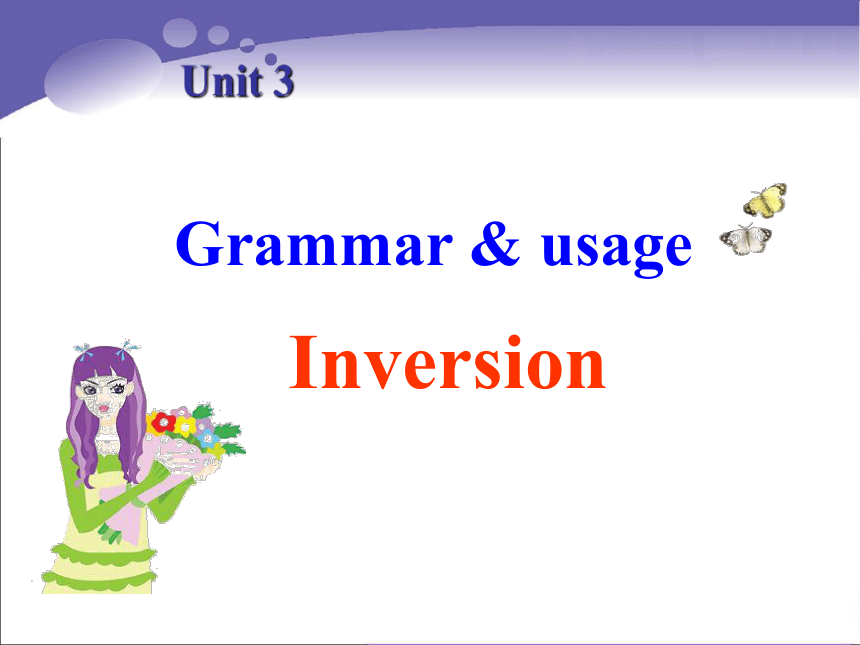 | |
| 格式 | zip | ||
| 文件大小 | 140.1KB | ||
| 资源类型 | 教案 | ||
| 版本资源 | 牛津译林版 | ||
| 科目 | 英语 | ||
| 更新时间 | 2019-08-03 17:16:43 | ||
图片预览

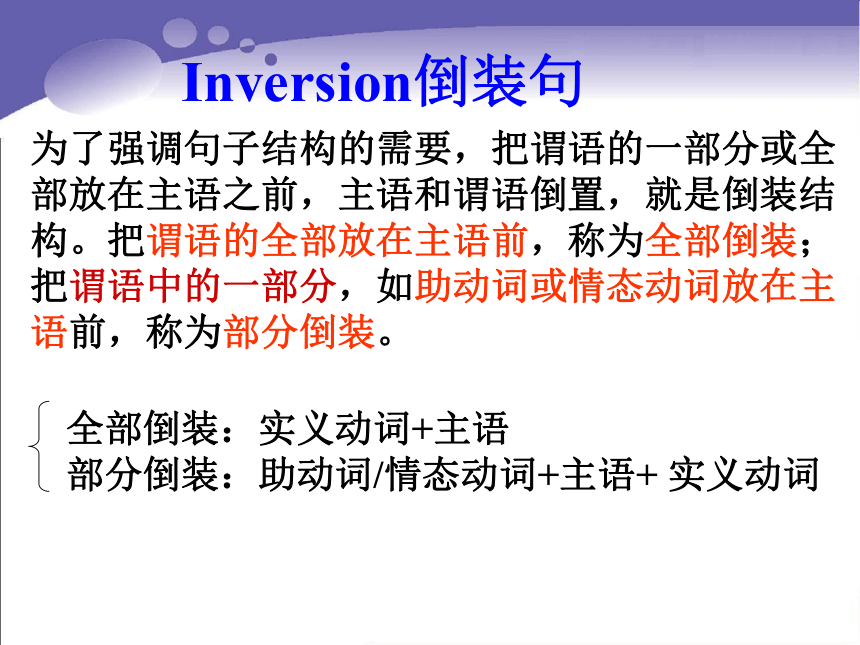
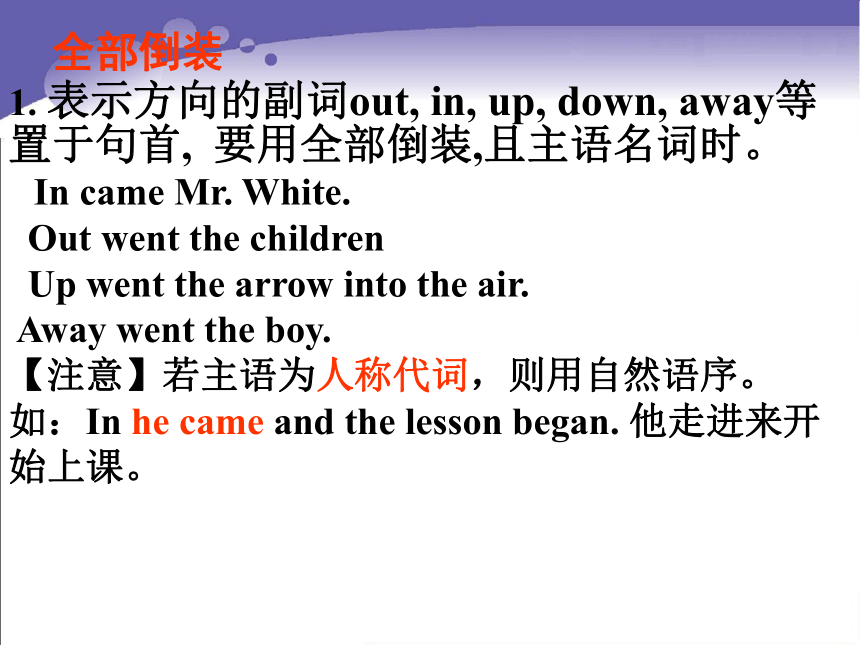
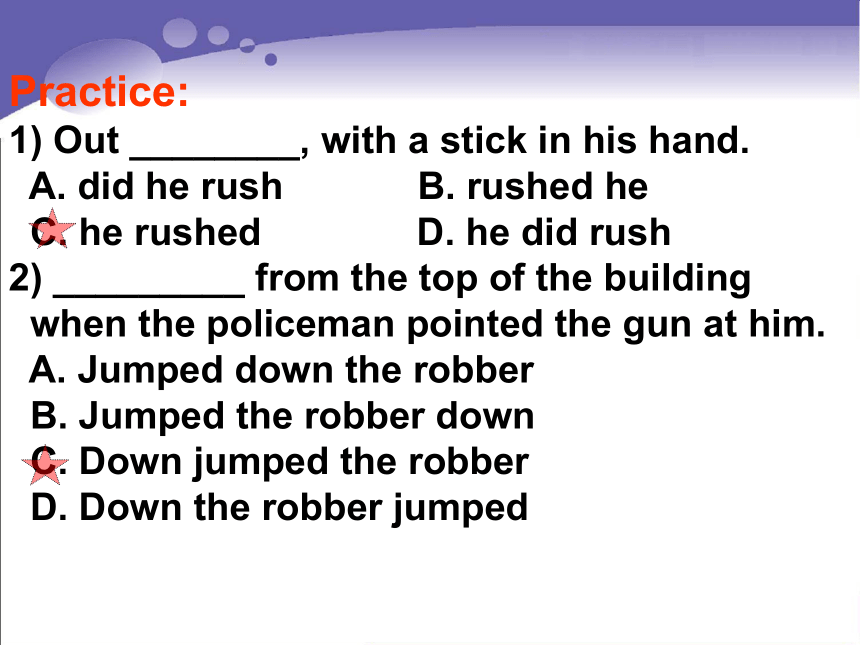
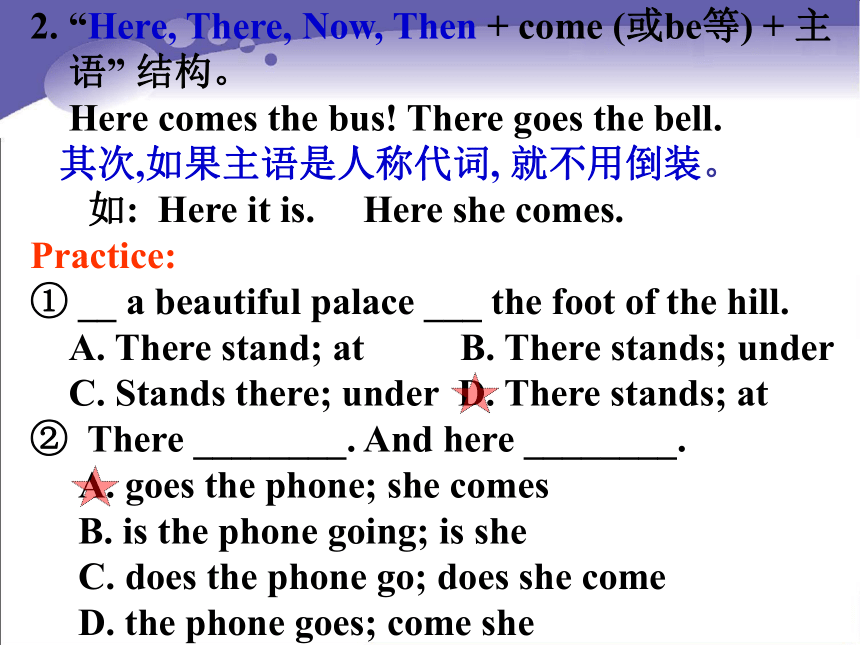
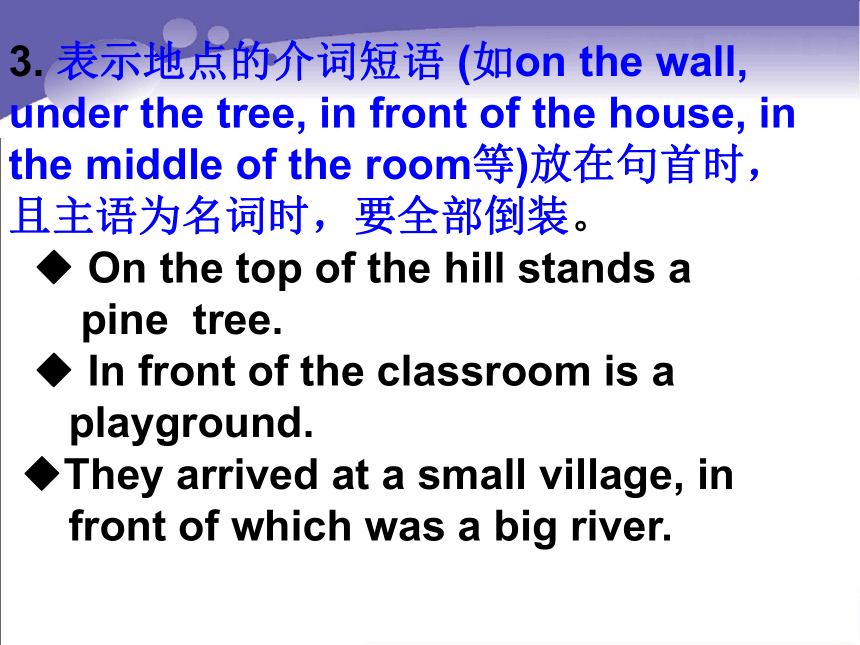
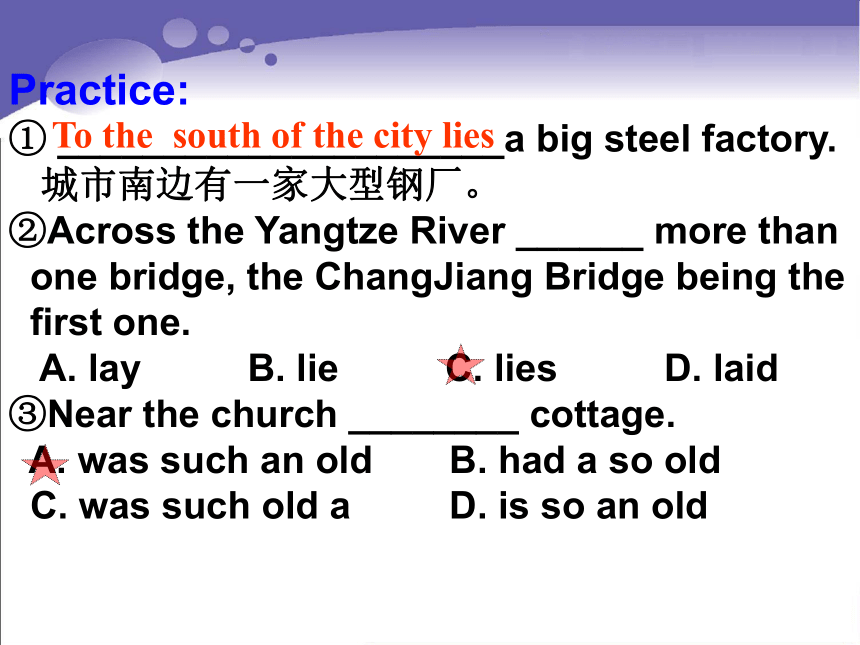
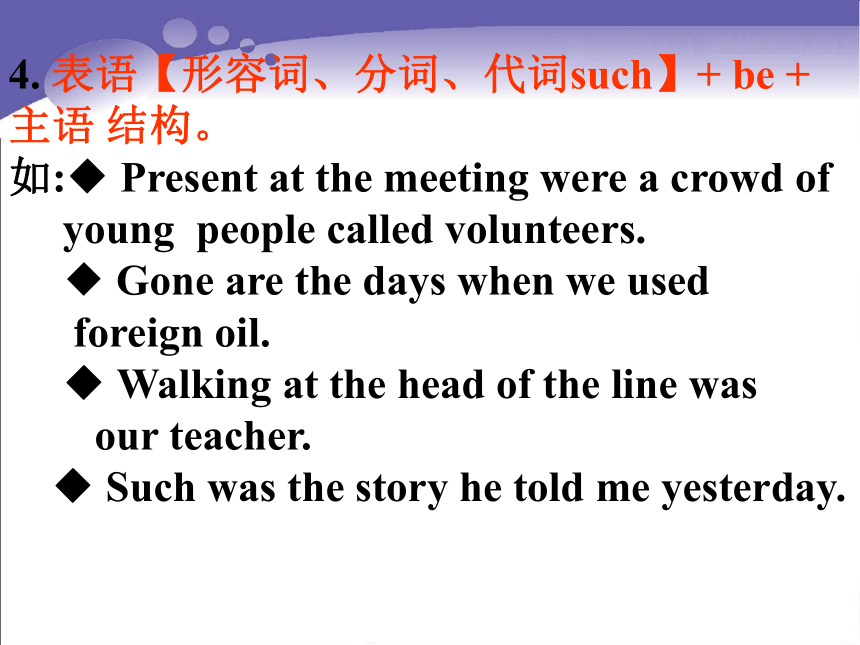
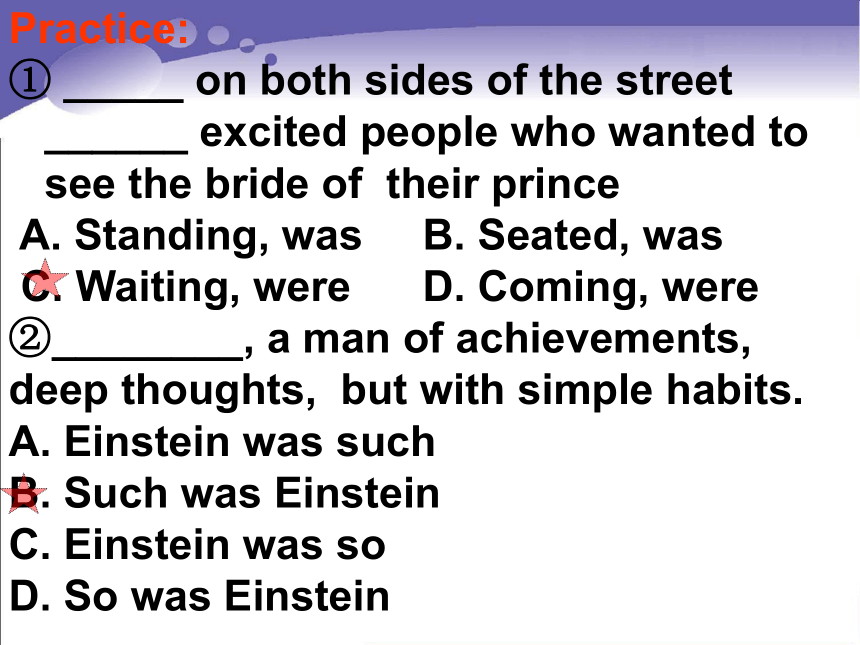
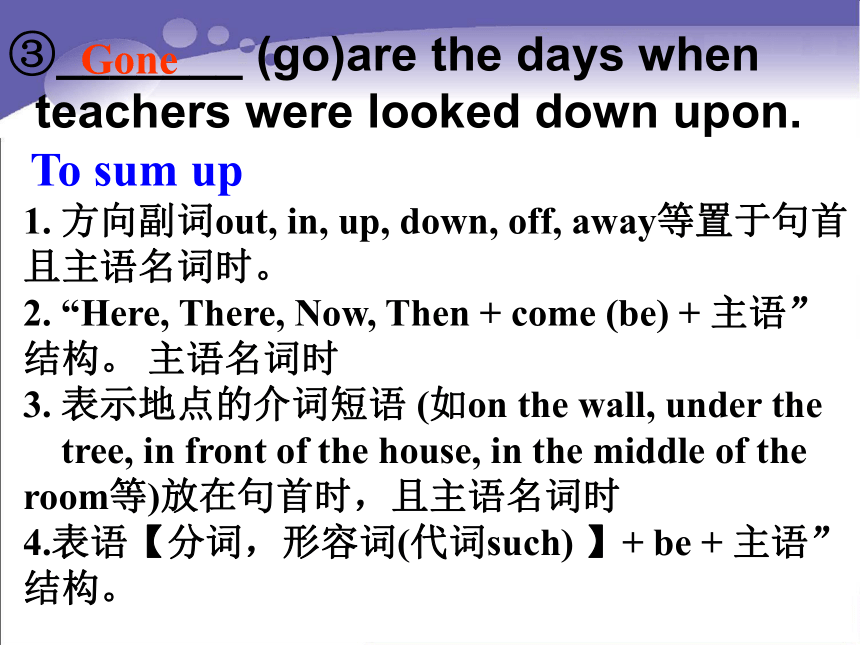
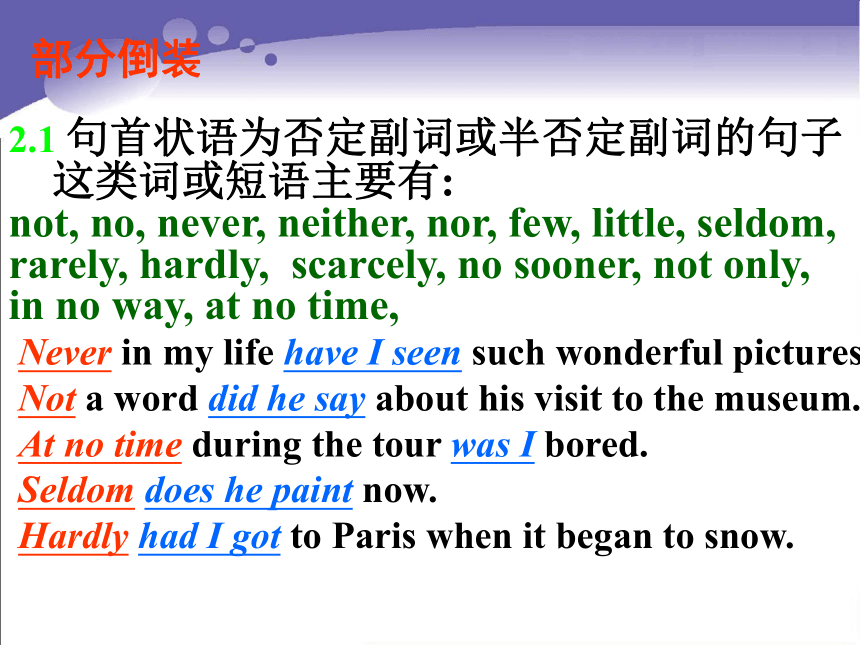
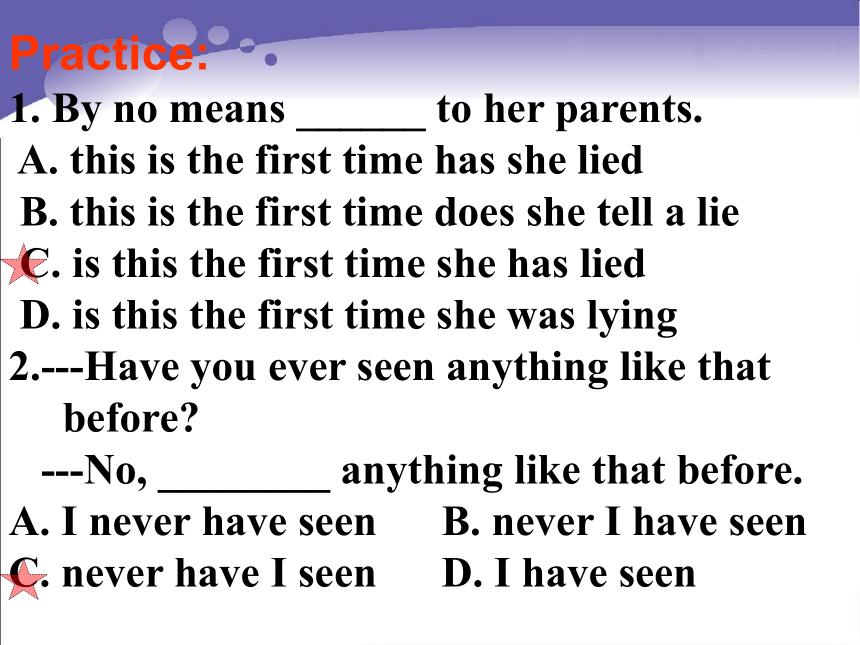
文档简介
课件48张PPT。Grammar & usage
Unit 3 Inversion为了强调句子结构的需要,把谓语的一部分或全部放在主语之前,主语和谓语倒置,就是倒装结构。把谓语的全部放在主语前,称为全部倒装;把谓语中的一部分,如助动词或情态动词放在主语前,称为部分倒装。 全部倒装:实义动词+主语 部分倒装:助动词/情态动词+主语+ 实义动词
Inversion倒装句全部倒装1. 表示方向的副词out, in, up, down, away等置于句首, 要用全部倒装,且主语名词时。
In came Mr. White.
Out went the children
Up went the arrow into the air.
Away went the boy.
【注意】若主语为人称代词,则用自然语序。
如:In he came and the lesson began. 他走进来开始上课。
Practice: 1) Out ________, with a stick in his hand. A. did he rush B. rushed he C. he rushed D. he did rush 2) _________ from the top of the building when the policeman pointed the gun at him. A. Jumped down the robber B. Jumped the robber down C. Down jumped the robber D. Down the robber jumped 2. “Here, There, Now, Then + come (或be等) + 主
语” 结构。
Here comes the bus! There goes the bell.
其次,如果主语是人称代词, 就不用倒装。
如: Here it is. Here she comes.
Practice:
① __ a beautiful palace ___ the foot of the hill.
A. There stand; at B. There stands; under
C. Stands there; under D. There stands; at
② There ________. And here ________.
A. goes the phone; she comes
B. is the phone going; is she
C. does the phone go; does she come
D. the phone goes; come she3. 表示地点的介词短语 (如on the wall, under the tree, in front of the house, in the middle of the room等)放在句首时,且主语为名词时,要全部倒装。 ◆ On the top of the hill stands a pine tree. ◆ In front of the classroom is a playground. ◆They arrived at a small village, in front of which was a big river. Practice: ① _____________________a big steel factory. 城市南边有一家大型钢厂。 ②Across the Yangtze River ______ more than one bridge, the ChangJiang Bridge being the first one. A. lay B. lie C. lies D. laid ③Near the church ________ cottage. A. was such an old B. had a so old C. was such old a D. is so an old To the south of the city lies 4. 表语【形容词、分词、代词such】+ be + 主语 结构。
如:◆ Present at the meeting were a crowd of
young people called volunteers.
◆ Gone are the days when we used
foreign oil.
◆ Walking at the head of the line was
our teacher.
◆ Such was the story he told me yesterday.
Practice: ① _____ on both sides of the street ______ excited people who wanted to see the bride of their prince A. Standing, was B. Seated, was C. Waiting, were D. Coming, were ②________, a man of achievements, deep thoughts, but with simple habits. A. Einstein was such B. Such was Einstein C. Einstein was so D. So was Einstein ③_______ (go)are the days when teachers were looked down upon. Gone To sum up1. 方向副词out, in, up, down, off, away等置于句首且主语名词时。
2. “Here, There, Now, Then + come (be) + 主语” 结构。 主语名词时
3. 表示地点的介词短语 (如on the wall, under the
tree, in front of the house, in the middle of the room等)放在句首时,且主语名词时
4.表语【分词,形容词(代词such) 】+ be + 主语”结构。
部分倒装 2.1 句首状语为否定副词或半否定副词的句子
这类词或短语主要有:
not, no, never, neither, nor, few, little, seldom, rarely, hardly, scarcely, no sooner, not only,
in no way, at no time,
Never in my life have I seen such wonderful pictures.
Not a word did he say about his visit to the museum.
At no time during the tour was I bored.
Seldom does he paint now.
Hardly had I got to Paris when it began to snow.
Practice: 1. By no means ______ to her parents. A. this is the first time has she lied B. this is the first time does she tell a lie C. is this the first time she has lied D. is this the first time she was lying 2.---Have you ever seen anything like that before? ---No, ________ anything like that before. A. I never have seen B. never I have seen C. never have I seen D. I have seen 2.2“Not only + 分句, but also + 分句”句型中的前一分句要部分倒装。 如: Not only does John love Chinese, he is also good at speaking it. 注意: not only ... but also ... 连接主语时,不倒装。 如: Not only the mother but also the children are sick. Practice: (1) _____himself wrong, but his friends were wrong. A. Not was only he B. Not only he C. Not only was he D. Not only was (2).Not only ___ give people relaxation and pleasure, but ___ increase their knowledge of any kind. A. can travel, it can B. travel can, can it C. can travel, can it D. travel can, it can 2.3.“ no sooner … than …, hardly /scarcely … when …”句型,句型的前半句谓语动词要用过去完成时,后半句谓语动词用一般过去时。 例如: No sooner had I come in than the telephone rang. 我刚进屋,电话铃就响了。 Practice: 1. Hardly ____ the airport when the plane took off. A. I had arrived at B. had I arrived C. had I reached D. I had got to 2.___________ got on the train when it started to move. A. Scarcely I had B. Scarcely had I C. No sooner I had D. No sooner had I 2.4. “not until...”句型,not until放在句首,从句不倒装,主句倒装。
例如:
Not until last week did they find the lost
bike. (简单句)
Not until my son had entered the university
did he realize the importance of time.
(复合句
注意:如果上述否定副词出现在强调句型,不用倒装: It was not until he went abroad that he knew the truth of the fact. Practice:
Not until I read the newspaper _______ the
Shenzhou VI would be launched.
A. did I know B. I knew
C. I know D. knew I
2. Not until I began to work ___ realize how much time I had wasted.
A. didn’t I B. did I C. I didn’t D. I2.5 Only + 状语放在句首, 要部分倒装。
◆Only on such a trip can you learn as much about European artists. (介词短语)
◆Only by this means is it possible to explain it. (介词短语)
◆Only then did I realize the importance of math. (副词)
◆Only when the war was over in 1918 was he able (从句)to get happily back to work.
注意:only+主语,则不倒装
Only teachers went to the art gallery yesterday.
Practice:
Only in this way ____ make progress in
your English.
A. you B. can you
C. you be able to D. will you able to
2. Only _____ as an interpreter _____ how important it was to practise speaking English.
A. when did I work…I realized
B. when did I work…did I realize
C. when I work…did I realize
D. when I worked…did I realize3. Only after talking to two students ______ that having strong motivation is one of the biggest factors in reaching goals. A. I did discover B. did I discover C. I discovered D. discovered I 2.6. “so/such ... that...”结构中,so或such及修饰的成分放于句首时前倒后不倒。 例如 ◆So loudly did he speak that even people in the next room could hear him. ◆Such great progress did he make that he was praised by his teacher. ◆So crowded was the art gallery that I could hardly move about. Practice: 1.So loudly ___ that ____hear her clearly. A. did she speak; could everyone B. did she speak; everyone could C. she spoke; could everyone D. she spoke; everyone could 2.--- Did you see who the driver was? --- No, so quickly _____ that I couldn’t get a good look at his face. A. did the car speed by B. the car sped by C. does the car speed by D. the car speeds by 2.7. so, neither, nor 开头的句子,表示重复前句的部分内容。原句的谓语应与前句的谓语的时态、形式相一致。 例如: ◆Li Ming enjoyed the museum. So did his grandmother and aunt. ◆You can't speak French. Neither/Nor can she. Practice:
1. I like sports and ________ my brother.
A. so does B. so is C. so can D. so likes
2. —Susan enjoys surfing the Internet on
Sundays.
—___________and ____________.
A. So she does; so I do B. So she does; so do I
C. So does she; so I do D. So does she; so do I
3.The doctor told Charlie to breathe deeply and __.
A. so did Charlie B. Charlie did so
C. Charlie does so D. did Charlie so 4. She is not fond of cooking, ________ I. A. so am B. nor am C. neither D. nor do 5.If you don't go, neither _______. A. shall I B. do I C. I do D. I shall 2.8.“neither … nor …”连接并列的句子,前后都倒装。 例: Neither am I impressed by the paintings nor do I like them. 我对油画没印象我也不喜欢。 Neither___________________________ it. 我不知道它,我也不在乎。 do I know it nor do I care about 2.9.用于“形容词(或副词、名词、动词)+ as (though) +主谓”引导的让步状语从句中。 例如 :Young as he is, he knows a lot. Try as he would, he might failed again. 【注意】:如果从句的表语是名词,其名词前不用冠词。 Child as he was, he had to make a living. 他虽是个孩子,但得糊口。 Bad-tempered man as Mr. Liu is, he loves us deeply. 刘老师脾气不好,但他深深地爱着我们。 Practice: 1.______, Carolina couldn't get the door open. A. Try as she might B. As she might try C. She might as try D. Might she as try (2).__________, he talks a lot about his favorite singers after class. A .A quiet student as he may be B. Quiet student as he may be C. Be a quiet student as he may D. Quiet as he may be a student 2.10.省略if的虚拟条件状语从句。(should, were, had提到句首,省略if。) If you were a teacher, what would you do then? ___________________________...? If we had made adequate preparations, the party would have been a success. ___________________________ …. . If you should have gone on the trip, you would have learnt a lot about painting. ____________________________ … .Were you a teacher , Had we made adequate preparations, Should you have gone on the trip, Practice: 1._________ it rain tomorrow, we would have to put off the visit to the Yang pu Bridge. A. Were B. Should C. Would D. Will 2.11.在以often, well, many a time, now and again 等方式或频度副词(短语)开头的句子中,要用部分倒装结构。 Many a time has John given me good advice. Often have we made that test. Practice: (1). Many a time ________ swimming alone. A. the boy went B. went the boy C. did the boy go D. did go the boy To sum up 部分倒装 1. 句首状语为否定副词或半否定副词的句子
2. not only … but also连接并列的句子,前倒后不倒(连接主语时不倒装)
3.no sooner … than …, hardly/scarcely … when. 句型。
4.not until …句型, 主句倒装,从句不倒装。
5.only和修饰的状语放于句首(修饰主语不倒装)
6.so … that, such … that中的so或such及修饰的成分放于句首时前倒后不倒。7.so, neither或nor表示前句内容也适用于另外的人或事。 8.neither … nor …连接并列的句子,前后都倒装。 9.“形容词(或名词、动词)+ as (though) ”引导的让步状语从句。 10.省略if的虚拟条件句 11. 以often, well, many a time, now and again 等方式或频度副词(短语)开头的句子 More practice:
A. Go through Part A on P41 and underline the
inversions included in the passage
1.Here we are in London at last!
2.It was a lot of fun because in the dormitory were
lots of people from different places.
3. Aunt really enjoyed France and so did grandma
and I.
4. Hardly had we left the dormitory the next morning when we realized we had left our map in the room. 5. Had you come with us, I guarantee you would have enjoyed Europe too. 6. Is there anything special that I can bring you? B. Invert the following sentences using the structures with negative words.(P41.B) 1. I have never seen such beautiful flowers in the city. 2. I do not have time to go to the museum today and I also do not want to. 3. I could hardly believe my eyes when I saw the sculpture in the museum. 4. The artist is always drawing; he is seldom seen without a notebook in his hand. Keys:
Never have I seen such beautiful flowers in
the city.
2. Neither do I have time to go to the museum
today and nor do I want to.
3. Hardly had I started to look at the paintings
when the teacher said it was time to leave the
museum.
4. The artist is always drawing; seldom is he seen without a notebook in his hand.Self-assessment(1) Now __________ your turn to recite the text.
A. there is B. there comes
C. comes D. has come
(2) Only then ___________ how much damage had been caused.
A. she realized B. she had realized
C. had she realized D. did she realize (3) Nowhere else along the coast ___________ such shallow water so far from land.
A. is there B. is it
C. there is D. it is
(4) Never ___________ a language so widely spread or spoken by so many people as English.
A. there has been B. it has been
C. has there been D. has it been
(5) _________ had he got on the train _______ he realized he had left his bag in the car.
A. Hardly; when B. Hardly; then
C. No sooner; when D. No sooner; then (6) —It’s burning hot today, isn’t it?
—Yes. __________ yesterday.
A. So was it B. So it was
C. So it is D. So is it
(7) __________ about wild plants that they decided to make a trip to Africa for further research.
A. So curious the couple was
B. So curious were the couple
C. How curious the couple were
D. The couple was such curious(8) Not until the early years of the 19th century _________ what heat is.
A. man did know B. man knew
C. didn’t man know D. did man know
(9) In no city of China, little __________ about the economic development.
A. the government cares
B. does the government care
C. doesn’t the government care
D. the government doesn’t care
(10) Autumn coming, down _____________.
A. do the leaves fall
B. the leaves will fall
C. fall the leaves
D. the leaves have fallen
D. Translate the following sentences 1. 只有通过合理使用互联网,我们才能从中 获益. (only) 2. 我们不仅要促进经济的发展还要重视保护 环境。(not only… but also ) Not only should we promote economic development, but also we should attach importance to the protection of the environment.Only by making proper use of the Internet /when we make proper use of the Internet can we benefit from it.
3. 只有用这种方式我们才能与大自 然和谐相处/ 使地球成为子孙后代美好生活的地点。(only) 4.虽然这幅画显得很荒唐,但它反映了一种常见的现象。( as ) Only in this way can we live in harmony with nature/ make the earth a better place for next generations to live on.
Ridiculous as the picture seems, it mirrors / reflects a common phenomenon.
5. 那个女孩如此粗心竟没能控制住自行车结果掉进里了。 (so… that) 6. 我们决不能以牺牲环境为代价来发展经济(by no means/ in no way/ in no case / on no account) So careless was the girl that she failed to control the bike and ended up falling into the river.
In no case should we develop economy at the cost of the environment.Assignment: 1. Review inversion. 2. Finish the exercises on the given paper. Thank you!
Unit 3 Inversion为了强调句子结构的需要,把谓语的一部分或全部放在主语之前,主语和谓语倒置,就是倒装结构。把谓语的全部放在主语前,称为全部倒装;把谓语中的一部分,如助动词或情态动词放在主语前,称为部分倒装。 全部倒装:实义动词+主语 部分倒装:助动词/情态动词+主语+ 实义动词
Inversion倒装句全部倒装1. 表示方向的副词out, in, up, down, away等置于句首, 要用全部倒装,且主语名词时。
In came Mr. White.
Out went the children
Up went the arrow into the air.
Away went the boy.
【注意】若主语为人称代词,则用自然语序。
如:In he came and the lesson began. 他走进来开始上课。
Practice: 1) Out ________, with a stick in his hand. A. did he rush B. rushed he C. he rushed D. he did rush 2) _________ from the top of the building when the policeman pointed the gun at him. A. Jumped down the robber B. Jumped the robber down C. Down jumped the robber D. Down the robber jumped 2. “Here, There, Now, Then + come (或be等) + 主
语” 结构。
Here comes the bus! There goes the bell.
其次,如果主语是人称代词, 就不用倒装。
如: Here it is. Here she comes.
Practice:
① __ a beautiful palace ___ the foot of the hill.
A. There stand; at B. There stands; under
C. Stands there; under D. There stands; at
② There ________. And here ________.
A. goes the phone; she comes
B. is the phone going; is she
C. does the phone go; does she come
D. the phone goes; come she3. 表示地点的介词短语 (如on the wall, under the tree, in front of the house, in the middle of the room等)放在句首时,且主语为名词时,要全部倒装。 ◆ On the top of the hill stands a pine tree. ◆ In front of the classroom is a playground. ◆They arrived at a small village, in front of which was a big river. Practice: ① _____________________a big steel factory. 城市南边有一家大型钢厂。 ②Across the Yangtze River ______ more than one bridge, the ChangJiang Bridge being the first one. A. lay B. lie C. lies D. laid ③Near the church ________ cottage. A. was such an old B. had a so old C. was such old a D. is so an old To the south of the city lies 4. 表语【形容词、分词、代词such】+ be + 主语 结构。
如:◆ Present at the meeting were a crowd of
young people called volunteers.
◆ Gone are the days when we used
foreign oil.
◆ Walking at the head of the line was
our teacher.
◆ Such was the story he told me yesterday.
Practice: ① _____ on both sides of the street ______ excited people who wanted to see the bride of their prince A. Standing, was B. Seated, was C. Waiting, were D. Coming, were ②________, a man of achievements, deep thoughts, but with simple habits. A. Einstein was such B. Such was Einstein C. Einstein was so D. So was Einstein ③_______ (go)are the days when teachers were looked down upon. Gone To sum up1. 方向副词out, in, up, down, off, away等置于句首且主语名词时。
2. “Here, There, Now, Then + come (be) + 主语” 结构。 主语名词时
3. 表示地点的介词短语 (如on the wall, under the
tree, in front of the house, in the middle of the room等)放在句首时,且主语名词时
4.表语【分词,形容词(代词such) 】+ be + 主语”结构。
部分倒装 2.1 句首状语为否定副词或半否定副词的句子
这类词或短语主要有:
not, no, never, neither, nor, few, little, seldom, rarely, hardly, scarcely, no sooner, not only,
in no way, at no time,
Never in my life have I seen such wonderful pictures.
Not a word did he say about his visit to the museum.
At no time during the tour was I bored.
Seldom does he paint now.
Hardly had I got to Paris when it began to snow.
Practice: 1. By no means ______ to her parents. A. this is the first time has she lied B. this is the first time does she tell a lie C. is this the first time she has lied D. is this the first time she was lying 2.---Have you ever seen anything like that before? ---No, ________ anything like that before. A. I never have seen B. never I have seen C. never have I seen D. I have seen 2.2“Not only + 分句, but also + 分句”句型中的前一分句要部分倒装。 如: Not only does John love Chinese, he is also good at speaking it. 注意: not only ... but also ... 连接主语时,不倒装。 如: Not only the mother but also the children are sick. Practice: (1) _____himself wrong, but his friends were wrong. A. Not was only he B. Not only he C. Not only was he D. Not only was (2).Not only ___ give people relaxation and pleasure, but ___ increase their knowledge of any kind. A. can travel, it can B. travel can, can it C. can travel, can it D. travel can, it can 2.3.“ no sooner … than …, hardly /scarcely … when …”句型,句型的前半句谓语动词要用过去完成时,后半句谓语动词用一般过去时。 例如: No sooner had I come in than the telephone rang. 我刚进屋,电话铃就响了。 Practice: 1. Hardly ____ the airport when the plane took off. A. I had arrived at B. had I arrived C. had I reached D. I had got to 2.___________ got on the train when it started to move. A. Scarcely I had B. Scarcely had I C. No sooner I had D. No sooner had I 2.4. “not until...”句型,not until放在句首,从句不倒装,主句倒装。
例如:
Not until last week did they find the lost
bike. (简单句)
Not until my son had entered the university
did he realize the importance of time.
(复合句
注意:如果上述否定副词出现在强调句型,不用倒装: It was not until he went abroad that he knew the truth of the fact. Practice:
Not until I read the newspaper _______ the
Shenzhou VI would be launched.
A. did I know B. I knew
C. I know D. knew I
2. Not until I began to work ___ realize how much time I had wasted.
A. didn’t I B. did I C. I didn’t D. I2.5 Only + 状语放在句首, 要部分倒装。
◆Only on such a trip can you learn as much about European artists. (介词短语)
◆Only by this means is it possible to explain it. (介词短语)
◆Only then did I realize the importance of math. (副词)
◆Only when the war was over in 1918 was he able (从句)to get happily back to work.
注意:only+主语,则不倒装
Only teachers went to the art gallery yesterday.
Practice:
Only in this way ____ make progress in
your English.
A. you B. can you
C. you be able to D. will you able to
2. Only _____ as an interpreter _____ how important it was to practise speaking English.
A. when did I work…I realized
B. when did I work…did I realize
C. when I work…did I realize
D. when I worked…did I realize3. Only after talking to two students ______ that having strong motivation is one of the biggest factors in reaching goals. A. I did discover B. did I discover C. I discovered D. discovered I 2.6. “so/such ... that...”结构中,so或such及修饰的成分放于句首时前倒后不倒。 例如 ◆So loudly did he speak that even people in the next room could hear him. ◆Such great progress did he make that he was praised by his teacher. ◆So crowded was the art gallery that I could hardly move about. Practice: 1.So loudly ___ that ____hear her clearly. A. did she speak; could everyone B. did she speak; everyone could C. she spoke; could everyone D. she spoke; everyone could 2.--- Did you see who the driver was? --- No, so quickly _____ that I couldn’t get a good look at his face. A. did the car speed by B. the car sped by C. does the car speed by D. the car speeds by 2.7. so, neither, nor 开头的句子,表示重复前句的部分内容。原句的谓语应与前句的谓语的时态、形式相一致。 例如: ◆Li Ming enjoyed the museum. So did his grandmother and aunt. ◆You can't speak French. Neither/Nor can she. Practice:
1. I like sports and ________ my brother.
A. so does B. so is C. so can D. so likes
2. —Susan enjoys surfing the Internet on
Sundays.
—___________and ____________.
A. So she does; so I do B. So she does; so do I
C. So does she; so I do D. So does she; so do I
3.The doctor told Charlie to breathe deeply and __.
A. so did Charlie B. Charlie did so
C. Charlie does so D. did Charlie so 4. She is not fond of cooking, ________ I. A. so am B. nor am C. neither D. nor do 5.If you don't go, neither _______. A. shall I B. do I C. I do D. I shall 2.8.“neither … nor …”连接并列的句子,前后都倒装。 例: Neither am I impressed by the paintings nor do I like them. 我对油画没印象我也不喜欢。 Neither___________________________ it. 我不知道它,我也不在乎。 do I know it nor do I care about 2.9.用于“形容词(或副词、名词、动词)+ as (though) +主谓”引导的让步状语从句中。 例如 :Young as he is, he knows a lot. Try as he would, he might failed again. 【注意】:如果从句的表语是名词,其名词前不用冠词。 Child as he was, he had to make a living. 他虽是个孩子,但得糊口。 Bad-tempered man as Mr. Liu is, he loves us deeply. 刘老师脾气不好,但他深深地爱着我们。 Practice: 1.______, Carolina couldn't get the door open. A. Try as she might B. As she might try C. She might as try D. Might she as try (2).__________, he talks a lot about his favorite singers after class. A .A quiet student as he may be B. Quiet student as he may be C. Be a quiet student as he may D. Quiet as he may be a student 2.10.省略if的虚拟条件状语从句。(should, were, had提到句首,省略if。) If you were a teacher, what would you do then? ___________________________...? If we had made adequate preparations, the party would have been a success. ___________________________ …. . If you should have gone on the trip, you would have learnt a lot about painting. ____________________________ … .Were you a teacher , Had we made adequate preparations, Should you have gone on the trip, Practice: 1._________ it rain tomorrow, we would have to put off the visit to the Yang pu Bridge. A. Were B. Should C. Would D. Will 2.11.在以often, well, many a time, now and again 等方式或频度副词(短语)开头的句子中,要用部分倒装结构。 Many a time has John given me good advice. Often have we made that test. Practice: (1). Many a time ________ swimming alone. A. the boy went B. went the boy C. did the boy go D. did go the boy To sum up 部分倒装 1. 句首状语为否定副词或半否定副词的句子
2. not only … but also连接并列的句子,前倒后不倒(连接主语时不倒装)
3.no sooner … than …, hardly/scarcely … when. 句型。
4.not until …句型, 主句倒装,从句不倒装。
5.only和修饰的状语放于句首(修饰主语不倒装)
6.so … that, such … that中的so或such及修饰的成分放于句首时前倒后不倒。7.so, neither或nor表示前句内容也适用于另外的人或事。 8.neither … nor …连接并列的句子,前后都倒装。 9.“形容词(或名词、动词)+ as (though) ”引导的让步状语从句。 10.省略if的虚拟条件句 11. 以often, well, many a time, now and again 等方式或频度副词(短语)开头的句子 More practice:
A. Go through Part A on P41 and underline the
inversions included in the passage
1.Here we are in London at last!
2.It was a lot of fun because in the dormitory were
lots of people from different places.
3. Aunt really enjoyed France and so did grandma
and I.
4. Hardly had we left the dormitory the next morning when we realized we had left our map in the room. 5. Had you come with us, I guarantee you would have enjoyed Europe too. 6. Is there anything special that I can bring you? B. Invert the following sentences using the structures with negative words.(P41.B) 1. I have never seen such beautiful flowers in the city. 2. I do not have time to go to the museum today and I also do not want to. 3. I could hardly believe my eyes when I saw the sculpture in the museum. 4. The artist is always drawing; he is seldom seen without a notebook in his hand. Keys:
Never have I seen such beautiful flowers in
the city.
2. Neither do I have time to go to the museum
today and nor do I want to.
3. Hardly had I started to look at the paintings
when the teacher said it was time to leave the
museum.
4. The artist is always drawing; seldom is he seen without a notebook in his hand.Self-assessment(1) Now __________ your turn to recite the text.
A. there is B. there comes
C. comes D. has come
(2) Only then ___________ how much damage had been caused.
A. she realized B. she had realized
C. had she realized D. did she realize (3) Nowhere else along the coast ___________ such shallow water so far from land.
A. is there B. is it
C. there is D. it is
(4) Never ___________ a language so widely spread or spoken by so many people as English.
A. there has been B. it has been
C. has there been D. has it been
(5) _________ had he got on the train _______ he realized he had left his bag in the car.
A. Hardly; when B. Hardly; then
C. No sooner; when D. No sooner; then (6) —It’s burning hot today, isn’t it?
—Yes. __________ yesterday.
A. So was it B. So it was
C. So it is D. So is it
(7) __________ about wild plants that they decided to make a trip to Africa for further research.
A. So curious the couple was
B. So curious were the couple
C. How curious the couple were
D. The couple was such curious(8) Not until the early years of the 19th century _________ what heat is.
A. man did know B. man knew
C. didn’t man know D. did man know
(9) In no city of China, little __________ about the economic development.
A. the government cares
B. does the government care
C. doesn’t the government care
D. the government doesn’t care
(10) Autumn coming, down _____________.
A. do the leaves fall
B. the leaves will fall
C. fall the leaves
D. the leaves have fallen
D. Translate the following sentences 1. 只有通过合理使用互联网,我们才能从中 获益. (only) 2. 我们不仅要促进经济的发展还要重视保护 环境。(not only… but also ) Not only should we promote economic development, but also we should attach importance to the protection of the environment.Only by making proper use of the Internet /when we make proper use of the Internet can we benefit from it.
3. 只有用这种方式我们才能与大自 然和谐相处/ 使地球成为子孙后代美好生活的地点。(only) 4.虽然这幅画显得很荒唐,但它反映了一种常见的现象。( as ) Only in this way can we live in harmony with nature/ make the earth a better place for next generations to live on.
Ridiculous as the picture seems, it mirrors / reflects a common phenomenon.
5. 那个女孩如此粗心竟没能控制住自行车结果掉进里了。 (so… that) 6. 我们决不能以牺牲环境为代价来发展经济(by no means/ in no way/ in no case / on no account) So careless was the girl that she failed to control the bike and ended up falling into the river.
In no case should we develop economy at the cost of the environment.Assignment: 1. Review inversion. 2. Finish the exercises on the given paper. Thank you!
